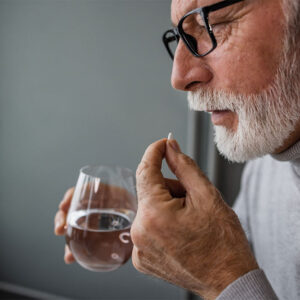
Never Go to a Hospital Without THIS
A couple years back, I was in the hospital for a few days after a head injury.
My treatment was going well… but it didn’t take me long to realize why so many people get sicker at hospitals.
They refuse to bring you out into the sun, which is important to your recovery.
And you’re constantly bombarded by blue light from the fluorescent overhead lighting that is everywhere at hospitals.
Hospitals are one of the worst offenders when it comes to 24-7 blue light exposure.
And spending all day under blue light interferes with your circadian rhythm, throws your hormones out of whack, causes sleep problems, and has been linked to high blood sugar and weight gain.
It’s a recipe for a health disaster.
Now, hospitals are finally starting to understand the problem.
But you can take action now. If you have a hospital stay coming up, one cheap item could help protect your health.
Let me explain…
The problem with being exposed to standard lighting is that—even when dimmed—it puts out a constant blue light that disrupts a patient’s circadian rhythm.
This prevents your body from producing enough melatonin during the day and suppresses its release at night—when we need it to help fall asleep.
The result of this sleep cycle disruption is insomnia, fatigue, and sleepiness—issues that increase the risk of depression, pain sensitivity, and recovery time.
That’s the opposite of what you’d want for people recovering in the hospital.
Now, researchers have found a way to avoid those unnecessary hospital dangers.
The idea is to install special circadian lighting that follows more closely to a natural day/night cycle. During the day, these lights contain even more blue light, promoting alertness. But at night, even when the lights are on, they will not contain the blue light that can cause nighttime problems.
Using this special lighting will help patients sleep better, while also speeding recovery—which is exactly what you need when you’re in the hospital.
Numerous studies have been conducted in clinical settings from nursing homes to neonatal intensive care units showing the benefits of using circadian lighting:
- Studies have shown that using circadian lighting in patients with Alzheimer’s have helped restore sleep patterns, while also reducing depression and agitation.
- In patients with a type of cancer called myeloma, using circadian lighting helped them sleep better and have less fatigue.
- In patients saying in the ICU after cardiac surgery, using circadian lighting also helped them sleep better and have less fatigue.
- In a study of stroke victims in the hospital, using circadian lighting improved scores on tests of sleep and depression.
The research is there.
Now it’s time for hospitals to implement this safe, effective strategy for reducing fatigue and depression—and all of the effects associated with them—in patients staying in the hospital for long periods of time.
Until these types of circadian lights become the standard, here’s what you need to do.
If you’re staying at a hospital and are capable of moving, always insist on getting some sun exposure every morning. Being outside in the sun will help set your circadian rhythm for the day.
Next, wear amber blue-light blocking glasses starting at 8 p.m. (you can get them at Amazon.com).
Having these glasses with you during your hospital stay can go a long way toward reducing your blue light exposure and protecting your health.
To a brighter day,
Dr. Richard Gerhauser, M.D.
Written By Dr. Richard Gerhauser, M.D.
For years he’s been the trusted doctor for celebrities, world-class athletes, and countless seniors looking to reclaim their health.
And now…for the first time ever… he’s making his medical breakthroughs available to readers all across America.
Dr. Richard Gerhauser, M.D. is one of the most pioneering and innovative minds in medicine today – and he delivers cutting-edge cures each month through his Natural Health Response newsletter.
Natural Health Response readers get full access to Dr. Gerhauser’s protocols for chronic pain… heart disease… diabetes… Alzheimer’s… and even cancer. These are the very same treatments Dr. Gerhauser recommends to his own patients at his practice in Tucson, Arizona.
In addition to being a board-certified medical doctor, Dr. Gerhauser has earned two master’s degrees and has served as a clinical professor at the University of Arizona.
And as a physician at the world-famous Canyon Ranch, Dr. Gerhauser treated celebrities from around the world who paid dearly for the type of next-generation health information he provides Natural Health Response readers each month.
View More Free Articles
Mother Nature's Bone-Building Secret REVEALED
Mainstream medicine has peddled the same old song and dance about osteoporosis for years. Pop some calcium pills… do some jumping jacks… and cross your fingers that your bones don’t crumble like a stale cookie. But what if I told you Mother Nature has been hiding a bone-building secret right under our noses? And we […]
The INCREDIBLE Payoff for Delaying Diabetes
If you don’t know where your blood sugar levels stand, it’s time to get them checked. It’s estimated that one in three adults has prediabetes, yet 80 percent of these folks have NO IDEA they’re in this category. That’s a BIG problem because most people will develop type 2 diabetes within just five years of […]
The Biggest Dementia Risk Factor REVEALED
I’m sure you’re familiar with the Skeleton Dance song… “The foot bone is connected to the leg bone. The leg bone is connected to the knee bone…” It’s easy to think of our bones being linked because we can physically see them. What’s less obvious is that everything else about your health is JUST as […]
It's NEVER Too Late to Kick This Dangerous Habit
You’ve heard it a million times before: “Smoking is bad for you.” If you’re still lighting up, I bet you remember a time when smoking wasn’t just accepted—it was downright fashionable. Remember when you could smoke in restaurants, on airplanes, and even in hospitals? Heck, movie stars even made it look cool and sophisticated. Well, […]
The TRUTH About ED No One's Talking About
It’s a subject most men would rather sweep under the rug… erectile dysfunction (ED). But you’re not alone if you’re having trouble in the bedroom. In fact, ED affects up to 30 million men in the U.S. alone. However, popping a little blue pill isn’t the answer. ED drugs are often just slapping a Band-Aid […]
Don’t Let Muscle Loss RUIN Your Golden Years
For older women, muscle mass can take a nosedive after menopause. This means more than trouble carrying in the groceries. Over time, the decline in muscle mass can lead to mobility problems, balance problems, falls, and ultimately a loss of independence. Staying active is a critical piece of the puzzle. But now, researchers have discovered […]
The Bad Habit Causing Lupus
All autoimmune diseases are on the rise—but lupus is one of the worst. When the condition strikes, your immune system starts to attack healthy tissues. Lupus cases have increased by 60 percent in women and have increased six-fold in men over the past four decades. What’s driving this dramatic increase? Well, we might have found […]
SHOCKING Missing Piece of the Diabetes Puzzle Discovered
I’ve been saying for years that there’s MORE to type 2 diabetes than your weight—or even your diet. Sure, they play their part. But unless you’re adding in THIS missing piece of the puzzle, you could be increasing your risk of type 2 diabetes despite your best efforts to avoid it. And you’ll never guess […]
Ditch the Chips and DEFY Aging
Sometimes, you just want something to crunch on. The craving can send even the most health-conscious among us heading straight to the snack aisle. But before you reach for the potato chips—which can contain all kinds of harmful ingredients—I have a better idea. Try THIS crunchy, healthy snack instead of loading up ingredients that can […]
Is Aspirin DEADLY? (Get the Truth Here)
Old habits die hard… especially when we’ve been led to believe they’re good ones. We were told for years that taking an aspirin a day would lower the risk of heart attack and stroke. But for many, those were empty promises that came with a LOT of risk… and LITTLE reward. That’s why, if you’re […]










